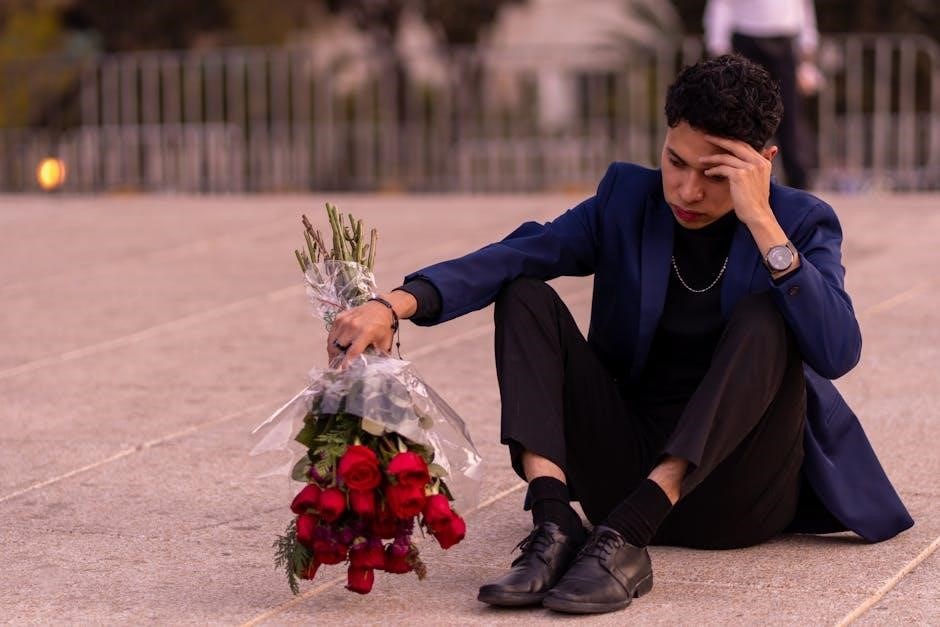Concrete Rose, a prequel to The Hate U Give, explores Maverick Carter’s journey in 1990s Garden Heights, delving into themes of identity, family, and systemic racism. Written by Angie Thomas, it offers a poignant look at Black adolescence, setting the stage for Starr’s story. The novel has garnered acclaim for its raw portrayal of community and resilience, making it a vital read for understanding the roots of The Hate U Give.
Overview of Concrete Rose
Concrete Rose, a prequel to The Hate U Give, delves into the life of Maverick Carter, Starr’s father, in 1990s Garden Heights. It explores his journey as a teenager navigating gang life, family responsibilities, and identity. Written by Angie Thomas, the novel provides a raw, emotional portrait of Black adolescence, highlighting systemic racism, loyalty, and resilience. Its vivid storytelling sets the foundation for understanding the events of The Hate U Give.
Significance as a Prequel to The Hate U Give
Concrete Rose serves as a powerful prequel to The Hate U Give, offering insight into Maverick Carter’s formative years. It explores his struggles with identity, family, and loyalty, laying the groundwork for Starr’s story. By delving into the origins of systemic issues and personal choices, the novel enriches the reader’s understanding of the characters and themes central to The Hate U Give, providing a deeper connection to the narrative.
Angie Thomas is a renowned American author celebrated for her impactful young adult novels. Born in Jackson, Mississippi, she draws inspiration from her experiences and societal issues. Her debut, The Hate U Give, became a bestseller and sparked crucial conversations about race and justice. With Concrete Rose, Thomas continues to explore themes of identity, family, and systemic inequality, solidifying her role as a vital voice in contemporary literature.
Author Background
Angie Thomas, a Mississippi native, draws inspiration from her upbringing and societal issues. Her experiences shape her writing, particularly in Concrete Rose, reflecting her deep connection to her roots and commitment to addressing systemic inequities through storytelling.
Angie Thomas’s Literary Career
Angie Thomas, a renowned author, debuted with The Hate U Give, which became a bestseller and won multiple awards. Her subsequent works, including On the Come Up and Concrete Rose, solidified her reputation as a powerful voice in young adult literature. Thomas’s writing often addresses systemic racism, identity, and community, resonating deeply with readers and earning her widespread critical acclaim and a loyal fanbase.
Her Motivation for Writing Concrete Rose
Angie Thomas wrote Concrete Rose to explore the backstory of Maverick Carter, Starr’s father from The Hate U Give. She aimed to delve into themes of family, loyalty, and identity, while highlighting systemic racism and its impact on Black communities. By revisiting 1990s Garden Heights, Thomas sought to provide depth to Maverick’s character and offer a poignant reflection of Black boyhood and manhood in America.

Plot Summary
Concrete Rose follows 17-year-old Maverick Carter in 1990s Garden Heights, exploring his journey as a son, father, and community member. The story delves into loyalty, identity, and systemic racism, while highlighting the resilience of Maverick and those around him, setting the foundation for The Hate U Give.
Setting in 1990s Garden Heights
The story unfolds in the vibrant yet challenging neighborhood of Garden Heights during the 1990s, a time marked by social and economic struggles. This setting shapes the characters’ experiences, emphasizing themes of resilience and community. The era’s cultural and political climate influences Maverick’s journey, providing a rich backdrop for exploring identity and systemic issues in a deeply human way.
Maverick Carter’s Journey
Maverick Carter, a 17-year-old in 1990s Garden Heights, navigates life as the son of a former gang legend. His journey explores balancing family responsibilities, gang affiliations, and personal identity. As he faces systemic racism and societal pressures, Maverick learns harsh lessons about loyalty, manhood, and the consequences of his choices. His story is one of resilience, growth, and the struggle to define himself amidst chaos.
Key Themes: Family, Loyalty, Identity
Concrete Rose delves into the interconnected themes of family, loyalty, and identity through Maverick Carter’s experiences. Family ties shape his decisions, while loyalty to his community and legacy tests his morals. Identity emerges as Maverick navigates adolescence, grappling with societal expectations and systemic racism. These themes intertwine to portray a young Black man’s struggle to define himself amidst external pressures, highlighting resilience and self-discovery.
Themes and Symbolism
Concrete Rose explores systemic racism, Black identity, and resilience, with the title symbolizing growth amidst adversity. The narrative delves into societal struggles and personal transformation, highlighting the strength found in community and self-discovery.
The Symbolism of the Title “Concrete Rose”
The title Concrete Rose symbolizes resilience and beauty in harsh environments, reflecting Maverick Carter’s journey. It embodies the struggle of growing up in a challenging world, where strength and vulnerability coexist. The rose, a delicate flower, thrives in concrete, mirroring the protagonist’s ability to find hope and identity amidst adversity, highlighting themes of perseverance and the pursuit of a better life.
Exploration of Systemic Racism
Concrete Rose delves into systemic racism through Maverick Carter’s experiences in 1990s Garden Heights. The novel highlights how institutional inequalities, such as police brutality and economic disparity, trap communities in cycles of poverty and violence. Angie Thomas’s vivid portrayal sheds light on the oppressive systems that shape the lives of Black individuals, emphasizing the need for societal change and collective resistance against injustice.
Black Identity and Community
In Concrete Rose, Angie Thomas beautifully portrays the strength and resilience of Black identity and community. Maverick Carter’s journey highlights the importance of cultural heritage and the bonds that unite his neighborhood. The novel celebrates the vibrancy of Black culture, from music to art, while also addressing the challenges faced by Black communities. Through Garden Heights, Thomas illustrates the power of unity and collective support in overcoming adversity.
Character Analysis
Maverick Carter’s journey in Concrete Rose is a compelling exploration of identity, loyalty, and growth. His transformation from a teenager to a responsible father highlights his resilience and love for family; The supporting characters, like his friends and community members, add depth to the narrative, showcasing the complexities of relationships and societal pressures.
Maverick Carter’s Character Development
Maverick Carter evolves from a self-centered teenager to a responsible father in Concrete Rose. His journey explores themes of identity, loyalty, and family, shaped by his father’s absence. The novel delves into his internal struggles, showcasing his growth as he navigates love, friendship, and societal pressures. His development is a testament to resilience and the pursuit of a better life for himself and his loved ones.
Significant Supporting Characters
In Concrete Rose, Maverick’s journey is enriched by a cast of dynamic characters. His friends, including his loyal crew, provide camaraderie and support, while his mother, Lisa, embodies strength and sacrifice. Love interests and rivals add depth, challenging Maverick’s perspectives and choices. These characters not only shape his identity but also highlight the complexities of community and relationships in 1990s Garden Heights, making them essential to the narrative’s emotional landscape.
Historical Context
Concrete Rose is set in the 1990s, capturing the socio-political climate of the time. It highlights systemic racism, economic struggles, and the vibrant culture of Garden Heights, providing a rich backdrop for Maverick’s story and the broader themes of identity and community.
Socio-Cultural Environment of the 1990s
The 1990s setting of Concrete Rose reflects a time of heightened racial tensions, economic inequality, and cultural shifts. Maverick navigates a world marked by systemic racism and limited opportunities, while the rise of hip-hop and Black cultural expression provides a backdrop of resilience and identity formation. This era shapes Maverick’s understanding of manhood and community, mirroring the broader struggles and vibrancy of Black life during this period.
Impact of Setting on the Narrative
The 1990s Garden Heights setting in Concrete Rose profoundly influences the narrative, immersing readers in a world of systemic racism, economic hardship, and cultural shifts. The environment shapes Maverick’s choices, highlighting themes of survival, loyalty, and identity. The gritty, vibrant backdrop underscores the struggles of Black communities while celebrating their resilience, creating a vivid context that deeply resonates with the story’s emotional core and character development.

Connection to The Hate U Give
Concrete Rose serves as a prequel, chronicling Maverick Carter’s life and setting the foundation for The Hate U Give. It explores the origins of key characters and events, offering deeper insight into the universe Angie Thomas created, while highlighting themes of family, identity, and systemic injustice that resonate across both stories.
Building the Universe
Concrete Rose masterfully constructs the universe of Garden Heights, detailing its socio-political landscape and cultural fabric. By tracing Maverick’s journey, Angie Thomas lays the groundwork for the events in The Hate U Give. The novel introduces key locations, gangs, and societal issues, creating a rich, immersive world that connects both stories seamlessly, enhancing the depth of the narrative and its characters.
Character Connections and Continuity
Concrete Rose intricately weaves character connections, linking Maverick Carter’s story to The Hate U Give. Maverick, Starr’s father, evolves from a teenage boy navigating gang life to a responsible parent. The novel highlights how his experiences shape Starr’s worldview. Secondary characters, like his friends and family, also influence Starr’s journey, creating a seamless bridge between the two narratives and enriching the understanding of Garden Heights’ enduring struggles and resilience.

Reception and Reviews
Concrete Rose has received widespread critical acclaim for its raw storytelling and emotional depth. Readers and critics praise its unflinching portrayal of Black identity and systemic racism, solidifying its place as a powerful prequel to The Hate U Give.
Critical Acclaim
Concrete Rose has been praised for its powerful narrative and unflinching exploration of systemic racism and Black identity. Critics highlight Angie Thomas’s ability to craft relatable characters and evoke emotional depth. The book’s raw storytelling has resonated deeply with readers, solidifying its place as a vital and impactful addition to contemporary young adult literature. Its acclaim underscores its necessity in fostering meaningful conversations about race and resilience.
Reader Responses and Popularity
Readers have embraced Concrete Rose for its authentic portrayal of Maverick’s journey, resonating with its themes of family and identity. The book’s popularity stems from its ability to spark empathy and reflection. Many have praised its accessibility and emotional depth, making it a favorite among young adult readers and a widely recommended title in contemporary literature.
Impact on Young Adults
Concrete Rose resonates deeply with teen readers, offering insights into identity, family, and systemic racism. Its relatable themes inspire reflection and empathy, fostering personal growth and social awareness among young adults.
Resonance with Teen Readers
Concrete Rose deeply resonates with teen readers, offering a raw portrayal of adolescence, identity struggles, and the challenges of growing up in a world filled with systemic inequalities. The novel’s authentic voice and relatable themes help young adults navigate their own struggles, fostering empathy and self-reflection. Its exploration of resilience and community provides readers with a powerful reminder of their own strength and potential.
Spark for Social Discussions
Concrete Rose serves as a powerful catalyst for social discussions, addressing systemic racism, gang life, and Black identity. Its unflinching portrayal of these issues encourages readers to reflect on justice, community, and personal responsibility. The novel’s themes resonate deeply, making it a valuable tool for sparking conversations about inequality and empowerment, particularly in classrooms and among young adults.
Concrete Rose by Angie Thomas is available in PDF format for digital reading, offering easy access to the story of Maverick Carter and his journey in Garden Heights, published by Walker Books in 2021.
Availability and Access
Concrete Rose by Angie Thomas is widely available in PDF format, accessible through various online platforms and ebook stores. Readers can download it from reputable sources like Amazon, Google Books, or direct purchases from the publisher. Additionally, libraries and educational institutions often provide digital copies, ensuring easy access for students and book enthusiasts. This accessibility helps readers engage with Maverick Carter’s compelling story anytime, anywhere.
Reading Tips and Benefits
Reading Concrete Rose in PDF format offers a convenient and immersive experience, allowing readers to delve into Maverick Carter’s journey. The novel provides deep insights into themes like identity and systemic racism, making it a valuable read for discussions on social justice. Reading it alongside The Hate U Give enhances understanding of the characters and their motivations, while its standalone nature ensures a compelling narrative for new readers.
Educational Use
Concrete Rose PDF is a valuable resource for classrooms, offering insights into systemic racism and identity. It complements The Hate U Give, fostering critical discussions on race and society.
Teaching in Classrooms
Concrete Rose is a powerful tool for educators, offering a raw exploration of systemic racism, identity, and community. Its themes resonate deeply with teen readers, fostering discussions on societal issues. The novel’s connection to The Hate U Give makes it ideal for curriculum integration, providing a comprehensive understanding of character development and historical context. It encourages critical thinking and empathy, enriching classroom experiences.
Lesson Plans and Activities
Concrete Rose offers rich opportunities for educational engagement. Teachers can develop lesson plans focusing on character analysis, thematic discussions, and creative writing prompts. Activities such as mapping Maverick’s journey, exploring systemic racism, and creating soundtracks for key scenes can deepen student understanding. Reflective writing and group discussions encourage critical thinking and empathy, making the novel a valuable tool for fostering connections and sparking meaningful conversations in the classroom.
Cultural Significance
Concrete Rose holds profound cultural significance as it contributes to race and identity discussions, offering a vivid portrayal of Black life and resilience. Angie Thomas’s work sparks essential conversations about systemic inequality, making it a pivotal piece in contemporary literature and a tool for fostering understanding and empathy across generations and communities.
Contribution to Race and Identity Discussions
Concrete Rose significantly contributes to race and identity discussions by offering a nuanced exploration of Black adolescence and systemic inequality. Through Maverick Carter’s story, Angie Thomas challenges stereotypes and provides authentic representation, fostering empathy and understanding. The novel’s portrayal of Black life, resilience, and community underscores its importance in broader societal conversations about race, identity, and justice, making it a vital read for diverse perspectives.
Role in Contemporary Literature
Concrete Rose plays a pivotal role in contemporary literature by addressing systemic racism and Black identity with unflinching honesty. Angie Thomas’s vivid storytelling bridges the past and present, offering a powerful exploration of societal issues. The novel’s authentic representation of Black experiences makes it a cornerstone of modern young adult literature, fostering essential discussions about race, justice, and resilience in today’s world.

Comparison with Other Works
Concrete Rose stands out among similar works for its raw portrayal of ’90s Garden Heights and Maverick’s journey, expanding the hated u give universe with unique depth and insight.
Similarities and Differences with The Hate U Give
While Concrete Rose shares the same universe and themes of systemic racism, it differs in its focus on Maverick’s coming-of-age story. Both novels highlight Black identity and resilience, but The Hate U Give centers on Starr’s activism, whereas Concrete Rose delves into the origins of Garden Heights’ struggles, offering a distinct yet complementary narrative experience.
On the Come Up: A Companion Novel
On the Come Up, another novel by Angie Thomas, serves as a companion to Concrete Rose and The Hate U Give. It follows Bri, a young rapper navigating systemic racism and community challenges. While sharing similar themes of identity and resilience, it offers a fresh perspective on activism and personal growth, further enriching the universe Thomas has created.

Behind-the-Scenes
Angie Thomas conducted extensive research on 1990s Garden Heights, immersing herself in its culture and systemic issues, to craft Concrete Rose’s authentic narrative, ensuring depth and realism.
Writing Process and Research
Angie Thomas meticulously researched 1990s Garden Heights, focusing on its socio-cultural dynamics and systemic issues to craft Concrete Rose’s authentic narrative. She explored themes of Black identity, community, and resilience, drawing from personal experiences and interviews to ensure the story’s depth and authenticity, ultimately shaping Maverick Carter’s compelling journey.
Publication Journey
Concrete Rose by Angie Thomas was published in 2021 by Walker Books, marking a significant release in young adult literature. The novel, a prequel to The Hate U Give, gained widespread attention for its raw exploration of systemic racism and Black identity. Available in hardcover, paperback, and digital formats, including a PDF version, it quickly became a bestseller and a Printz Honor Book, solidifying its place in contemporary literature.
Concrete Rose is a powerful exploration of identity, family, and systemic racism, offering a poignant prequel to The Hate U Give. Its availability as a PDF ensures accessibility for readers worldwide, cementing its impact on young adult literature and fostering essential discussions on race and resilience.
Reflecting on the Book’s Importance
Concrete Rose is a powerful exploration of identity, family, and systemic racism, offering a poignant prequel to The Hate U Give. Its availability as a PDF ensures accessibility for readers worldwide, cementing its impact on young adult literature and fostering essential discussions on race and resilience.
Final Thoughts on Concrete Rose
Concrete Rose is a compelling and emotional journey that deepens the universe of The Hate U Give. By exploring Maverick Carter’s story, Angie Thomas sheds light on the challenges of Black identity, family, and systemic racism. The book’s resonance with teen readers highlights its importance in fostering conversations about social justice and resilience, leaving a lasting impact on young adult literature and beyond.

